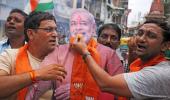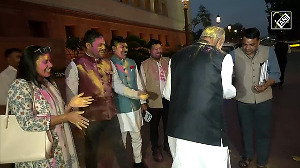The Modi government's revocation of Article 370 unfolded in the manner of a slow burn thriller movie that kept watchers guessing right up till Home Minister Amit Shah made the announcement in Parliament on Monday.

It had all the makings of a blockbuster -- deployment of security, suggestions of terror threats, house arrest of political leaders from the Kashmir Valley, and snapping of key communication modes, including internet, at the stroke of midnight.
All this began in the last week of July when the Centre ordered deployment of about 10,000 central forces personnel (100 companies) in Kashmir on grounds that it was to strengthen counter-insurgency operations and law and order duties.
However, the move was questioned by the state and opposition parties that raised concerns over the 'intentions' of the Union government and claimed that the Centre was planning "something big".
Panic started in the Valley, where more security force, mostly Central Reserve Police Force personnel, was deployed later at vulnerable spots in Srinagar and other parts of Kashmir. This was in addition to the 100 companies.
Drama heightened on Friday when the army said that Pakistan-based terrorists are planning to target the ongoing Amarnath Yatra followed by the Jammu and Kashmir administration issuing an advisory, asking the yatris and tourists to "curtail" their stay in the Valley and leave immediately.
Speculation ruled the roost with many pointing to the terror threats for the developments in Kashmir, while others sensing a big announcement over articles 35A and 370 providing special status to the state.
Tourists and Amarnath Yatra pilgrims started leaving the Kashmir Valley on Saturday following the state government's advisory.
To add to the drama, airlines were advised by the government to keep surging airfares in check on flights coming out of Jammu and Kashmir while railways also announced that it will not charge any cancellation fee from passengers coming or going from Kashmir.
Meanwhile, the state governor asked political leaders in the state to tell their supporters to maintain calm and not to believe "exaggerated rumours" that were being circulated in the Valley.
With tensions escalating and strong rumours over revocation of article 35A and 370, regional parties in Jammu and Kashmir on Sunday unanimously resolved to fight any attempt to abrogate the constitutional provisions that guarantee it special status or any move to trifurcate the state.
National Conference president Farooq Abdullah, reading out a resolution adopted at the meeting, said the parties have decided to send delegations to meet the president, the prime minister and leaders of various political parties to apprise them about the consequences of any attempt to abrogate Article 370 and Article 35A of the Constitution or carry out delimitation of constituencies or trifurcating the state.
Soon after the meeting, the unravelling of the suspense began with fast-paced developments in the Valley as authorities stepped up security at vital installations and in sensitive areas, suspended mobile internet services and either "arrested" or "detained" several leaders on Sunday night.
Both former chief ministers -- Omar Abdullah and Mehbooba Mufti -- said they were placed under house arrests, while Congress leader Usman Majid and Communist Party of India-Marxist MLA M Y Tarigami claimed to have been arrested around midnight.
Following a night of suspense, the Union Cabinet met. However, details of the discussion held during the meeting under the chairmanship of Prime Minister Narendra Modi were not divulged.
The meeting was immediately followed by a message from the Union home ministry that minister Shah will make a statement in Parliament, fuelling reports that a big announcement on Kashmir was in the offing.
Soon after the Rajya Sabha met, Shah announced the revocation of Article 370, capping days of speculation, anxiety and suspense.












 © 2025
© 2025